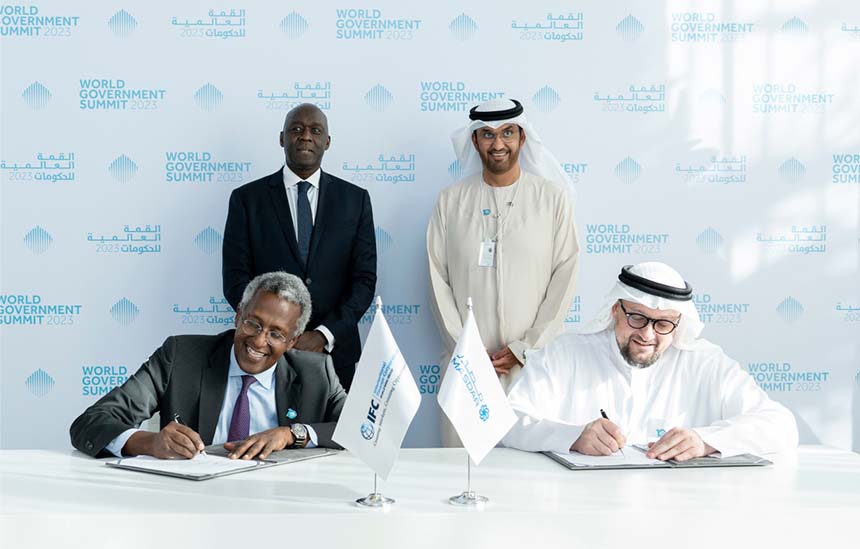• Parties sign collaboration framework on side-lines of World Government Summit 2023, taking place in Dubai
• Potential areas of collaboration include green hydrogen development, renewable energy in Africa, distributed photovoltaics, and development of innovative technologies
Masdar, one of the world’s fastest-growing renewable energy companies, has signed an agreement with the International Finance Corporation (IFC), the largest global development institution focused on the private sector in developing countries, to explore areas of collaboration to support climate action for emerging markets.
The collaboration framework was signed by Mohamed Jameel Al Ramahi, Chief Executive Officer, Masdar and Mohamed Gouled, Vice President of Industries at IFC, on the side-lines of the World Government Summit 2023, taking place in Dubai this week. HE Dr Sultan Al Jaber, UAE Minister of Industry and Advanced Technology, COP28 President-Designate, and Masdar Chairman, witnessed the signing, along with Makhtar Diop, Managing Director of IFC.
HE Dr Sultan Al Jaber, UAE Minister of Industry and Advanced Technology, COP28 President-Designate, said, “As the UAE prepares to host COP28, we have placed a special emphasis on ensuring better, more efficient and more equitable access to climate finance. The UAE is a trusted partner of many nations and actively supports the development of emerging nations. The International Finance Corporation has been a key partner for Masdar in a number of emerging markets, and this agreement carries forward the UAE’s commitment to equitable climate finance and inclusive sustainable development.”
Makhtar Diop, Managing Director of IFC, said, “We are excited to advance our partnership with Masdar today and leverage IFC’s climate expertise across emerging markets to support Masdar in achieving breakthroughs in sectors such as renewable energy, green hydrogen, and green finance.”
Under the agreement, Masdar and the IFC will explore support for the establishment of green hydrogen platform for emerging markets, and potential collaboration on bankability and structuring issues for African renewable energy projects. The framework also covers exploring mechanisms to accelerate the adoption of distributed photovoltaic (DPV) systems, and the development of innovative new technologies and business models in emerging markets in response to the evolving climate crisis.
Mohamed Jameel Al Ramahi, Chief Executive Officer, Masdar, said, “Masdar has a long history with the IFC, where we have worked together to fund clean energy projects from Jordan to Uzbekistan and other countries. We are confident this agreement will serve as the foundation for further impactful collaborations that advance sustainable development in the countries and communities that need it most.”
The IFC, which is a member of the World Bank Group, uses its capital, expertise, and influence to create markets and opportunities in developing countries.
Masdar is active in a number of emerging markets, developing utility-scale and DPV projects to bring clean energy to communities across Asia and Africa. Masdar has already completed many projects in African countries, including Egypt, Mauritania, Seychelles, and Morocco.
At the recently concluded Abu Dhabi Sustainability Week 2023 Masdar announced the signing of deals for projects with a combined generation capacity of 5 GW across Angola, Uganda, and Zambia as part of Etihad 7, a UAE-led initiative that aims to raise public- and private-sector funds to invest in the development of Africa’s renewable energy sector.
In addition to renewable energy, green hydrogen is an emerging new sector. According to a recent report from Masdar and McKinsey & Company, Africa could capture as much as 10 percent of the global green hydrogen market, helping to create up to 3.7 million jobs and adding as much as US$120 billion to the continent’s gross domestic product.

